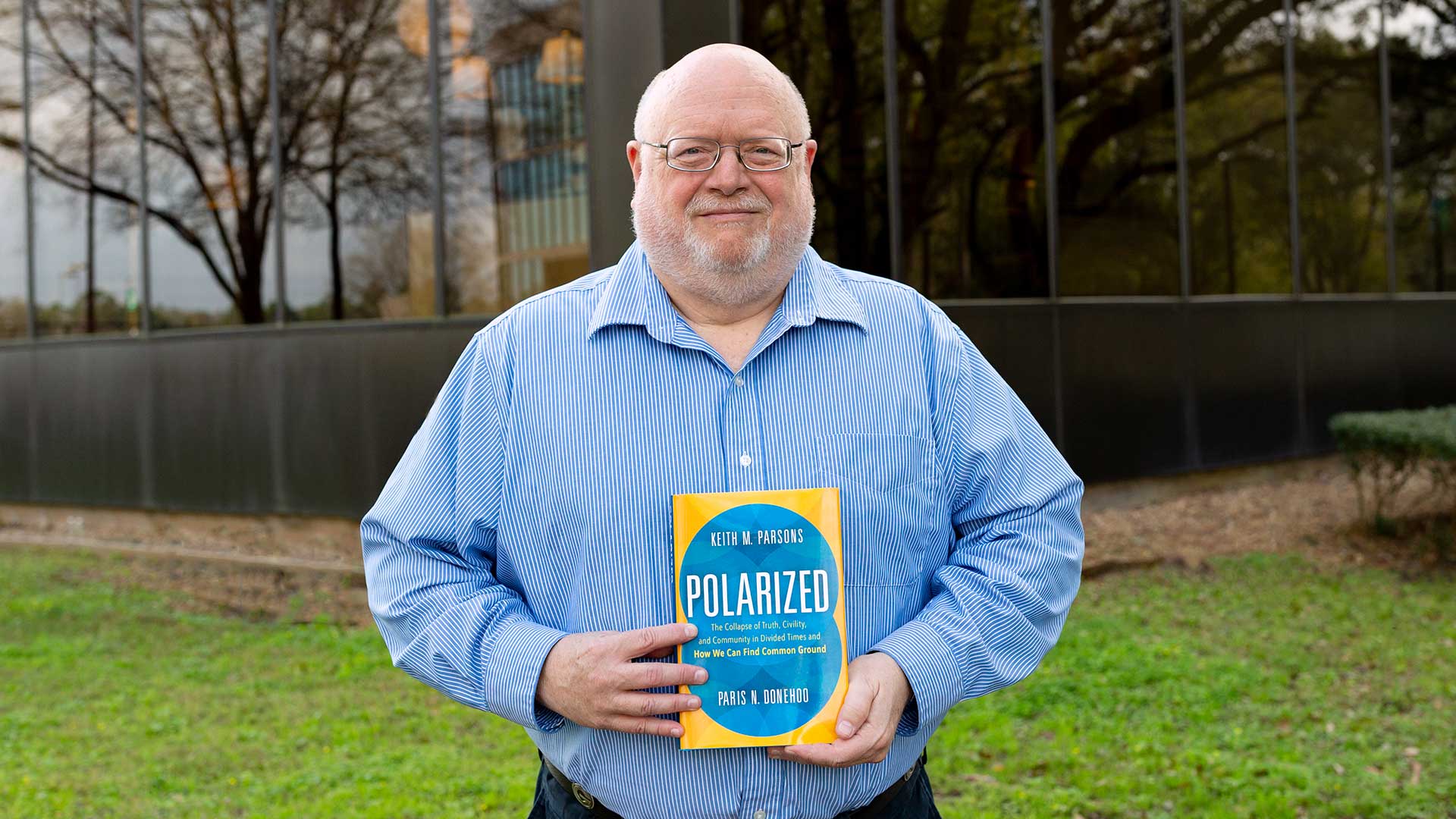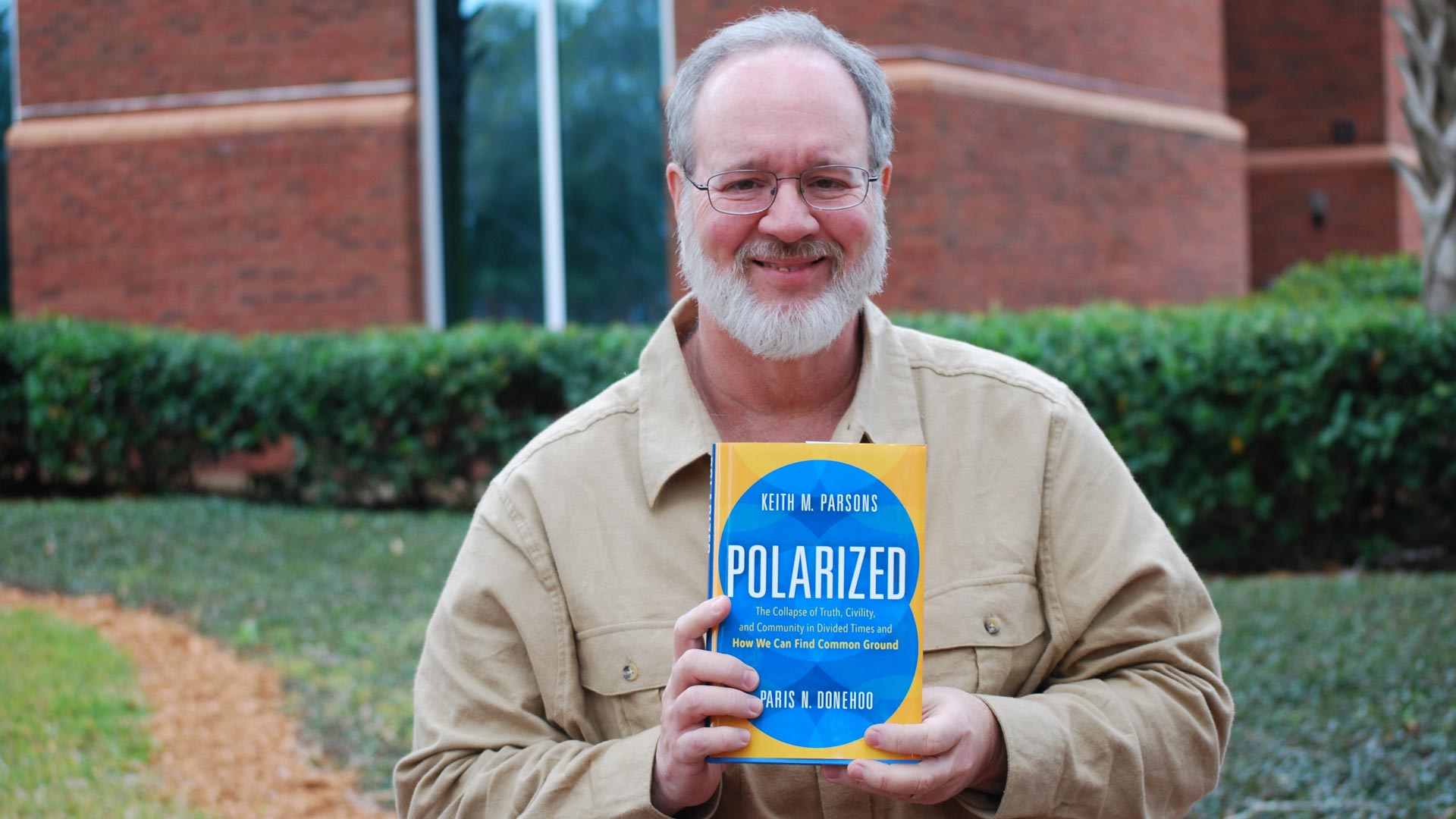UHCL prof's book aims to elevate political discourse, focus on common ground
February 16, 2019 | UHCL Staff

Keith Parsons remembers a time when Republicans and Democrats could lead open discussions about
politics with each other while maintaining the sense that one person could disagree
with another without tossing insults. Parsons, who is a professor of philosophy at University of Houston-Clear Lake, has co-authored a book with his longtime friend, retired United Church of Christ
minister Paris Donehoo, that he says was inspired by the 2016 election of Donald Trump
to the presidency.
The recently released book, titled “Polarized: The Collapse of Truth, Civility and
Community in Divided Times and How We Can Find Common Ground,” published by Prometheus
Books, explores what Parsons describes as three core problems. “One is that there
doesn’t seem to be any more respect for the truth,” he said. “We seem to be living
in a post-truth era. Whether something is true or not does not seem to matter. The
only important thing is that your side wins.”
Second, Parsons continued, is an apparent collapse in civility. “Since we’re both
older, we remember when people could actually work out compromises to their disagreements,”
he said. “The discourse in politics, even though it was always pretty raucous, could
achieve something other than contempt for the other person. Today, there’s a default
attitude that if others don’t have our opinions, we must regard them as evil or idiots.
Politics has always been rough, but it’s not a reason to disrespect someone with whom
you have a disagreement.”
And third, Parsons said that one of the founding principles of our country — “E pluribus
unum” — is in a state of total decay. “In the past, the ideal was to try to accept
people from anywhere. That was once our goal — pluralism. We would accept anyone as
long as they were willing to concede that everyone had the same rights,” Parsons said.
“With Trump, there seems to be a total rejection of that ideal, from when he first
announced his candidacy with a crude denunciation of Mexican immigrants. His tone
never improved throughout his campaign or his presidency.”
However, Parsons said he hopes the book will not be read as simply another anti-Trump
diatribe. “Our main topic is not to say bad things about Trump,” he said. “It’s to
encourage people to take the high ground in disagreements.”
Even in the midst of a disagreement, Parsons said, it’s possible to behave in a civil
manner. “Let your default assumption be that the person you’re disagreeing with is
decent and rational, just as you are.”
Donehoo said that central to the book’s overarching message is the fact that he and
Parsons come at the topics at hand from entirely different perspectives. “I’m a retired
minister and Keith is an atheist,” Donehoo said. “We have different values that we
can both hang on to, which we need to continue in order to have a functional civil
society. I think our differing perspectives makes the book better.”
Donehoo said he and Parsons had been friends since childhood, and they’d spent a great
deal of time together laughing. “But I believe the 2016 election wasn’t something
we could be lighthearted about,” he said. “There are truths that are verifiable. But
when it comes down to ultimate reality — not a matter of adding things up and coming
up with one solution — Keith sees everything as coming down to physics, and I believe
there’s a creator behind everything. Neither one of us can prove conclusively whether
there is or isn’t a God,” Donehoo said.
“The Bible doesn’t try to prove God’s existence, it just assumes that there is a God.
Keith looks to the author John Hick, who says the universe is ambiguous. From there,
I make my choice this way, and Keith makes his that way. We are allowed to make different
choices.”
Even though they’re exclusive in terms of how we frame our reality, Donehoo continued,
they don’t have to be exclusive in terms of what others value. “There is truth that
is demonstrably provable, but ultimate reality is not provable. That means you have
the right to see things from your own philosophical standpoint, but you can’t make
up facts. We believe we should move toward this in a larger sense in our society.”
Having lived through the turmoil of the Vietnam War era, Donehoo said that back then,
they’d thought democracy was falling apart. But this era feels different, especially
with the advent of social media, which gives people anonymity and the sense that they
don’t have to look someone in the eye and speak coherently. “As long as people think
they can just say anything and that passes for discussion, we’re in trouble,” he said.
“Disagreeing is part of learning and growing. One of the processes of writing this
is that I learned from Keith and I hope he learned from me. It’s a great byproduct
of the book.”
About the Author:
Recent entries by
October 18 2022
Better technology transforms campus safety: Police Chief demonstrates SafeZone to students
October 14 2022
Student's skill with drones takes chicken turtle research to new heights
October 11 2022
Planting event to help UHCL restore native plants to campus, support environmental sustainability








